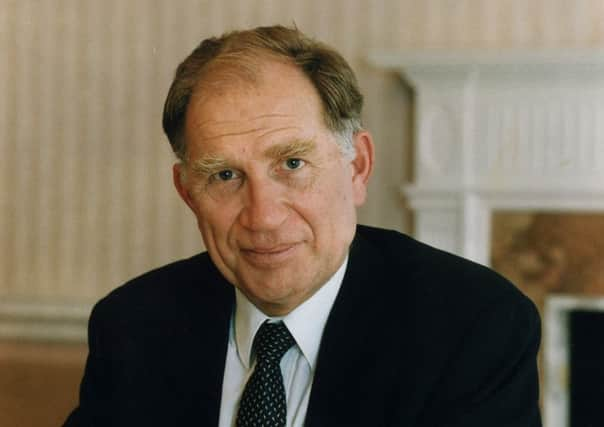Professor Sir Donald Mackay


His contribution to Scottish public debate has been immense. For more than 30 years he authored a stream of books and papers on Scotland’s political economy. He was an economic adviser to Secretaries of State for Scotland for more than 25 years. He was a co-founder of economic and planning consultancy Pieda. He served as chairman of Scottish Enterprise, went on to be chairman of Scottish Mortgage Investment Trust, co-founded the Policy Institute, served on the Advisory Board of Reform Scotland, spoke at or chaired innumerable conferences and seminars on public policy wrote countless articles for newspapers and periodicals including The Scotsman.
But what he will be most remembered for was his unfailing ability to stimulate, enliven and inspire. His approach to political economy was shot through with an iconoclasm and a disruptive wit and humour. Some would say his contributions bordered on the mischievous. More often, it seemed, mischief was at the core.
Advertisement
Hide AdAdvertisement
Hide AdHis thorough approach to evidence-based policy was never in doubt. But on subjects ranging from planning policy in Scotland to the contribution of North Sea oil, he was often the agent provocateur. To the conventional wisdom of the day Sir Donald excelled in rolling a hand grenade. This unfailing ability to stimulate and engage not only endeared him to many, it endowed those whom he taught with a lifelong interest and enthusiasm for matters economic.
Ben Thomson, former head of Reform Scotland recalls: “Donald was an ‘old school’ economist in the best sense. He didn’t just accept a prevailing view but was prepared to challenge it by looking at the underlying evidence, putting it into its historical context and using his vast experience over many years to come up with his own position.
“You always knew with Donald that any argument would be well thought through and refreshingly insightful. What is more is that he was not only good at talking but also excellent at listening and was always kind and considerate in his debate with others; in short, he was a complete gentlemen and he will be sorely missed”.
The broadcaster and former student Andrew Neil speaks for many: “I remember him as a lucid and expert teacher who had a great ability to explain the toughest concepts and who fired up my enthusiasm for economics. He was always courteous, humorous and formidably informed. He was a brilliant economist who linked the theoretical with the practical. His contribution to public policy was immense. If only more Scottish politicians had listened to him…”
In marked contrast to many of his contemporaries in Scotland, Sir Donald Mackay was more Schumpeter than Keynes, evident in his approach to one of his outstanding policy concerns: Scotland’s low business birth rate.
Despite many changes in the composition of Scotland’s economy in recent decades, this problem persisted and was, he argued, predominantly social and cultural in origin. He oversaw Scottish Enterprise studies in this area and brought incisive analysis. But if the problem became more widely understood, the attention of Holyrood to solutions was harder to come by.
Another preoccupation was Scotland’s planning system – in particular the frustration felt by many over the bureaucratic and time-consuming planning process. Here I incurred a robust telling-off from Sir Donald. In an article for The Scotsman I had put forward the conventional wisdom: appoint more planning officers. Before long my telephone rang. A fulminating Sir Donald demanded to know if I had taken leave of my senses. Creating more planners, he insisted, would not just fail to solve the problem but make it immeasurably worse, arguing that more planners would simply feed their appetite for ever more intrusion and regulatory oversight. It was some time later before I was able, with shaking hand, to replace the phone back on the receiver – and some considerable time before I wrote again about Scottish planning.
In later years Sir Donald became a strong advocate of Scottish home rule. In the run-up to the Scottish independence referendum he challenged Treasury estimates of future revenues from North Sea oil and gas, arguing that these, for political reasons, had been pitched unreasonably low. “There is no hole in the Scottish government’s oil predictions”, he declared, “but there is a mountain of black gold missing from {the UK Government’s).”
Advertisement
Hide AdAdvertisement
Hide AdNot for the first time, events were to usurp the trenchant convictions of economists. The oil price subsequently collapsed, and with it, tax revenue projections. To be fair, he rarely ventured into economic forecasting – particularly those based on the vagaries of commodity prices and currencies. And he would certainly have chuckled at the dictum of Kenneth Galbraith – “the only function of economic forecasting is to make astrology look respectable”.
A continuing preoccupation throughout his life was the high level of public expenditure in Scotland supporting a relatively large and inefficient public sector. But despite his many admonitions, he never convinced the political parties in Scotland, or the bulk of her population, that “more public expenditure is a sticking plaster and not a solution to a poor economic performance, unless it is directed to encouraging a higher business birth rate and a more dynamic market sector, the chief driver of economic growth”
To the end he pressed fundamental questions. And they are more pertinent today than ever. “What are the factors”, he once wrote, “that have held back our economy and our people? What, in a troubled and highly uncertain global context, when the future of Europe is being rewritten before our eyes, are the constraints and the opportunities for an empowered Scottish Government? What is it that we may now be able to undertake, that opens a future that is different to, and better than, what we have had until now?”
In constantly pressing these questions, and commanding our attention to finding answers, Sir Donald’s contribution to political economy was formidable, and will long endure.
bill jamieson